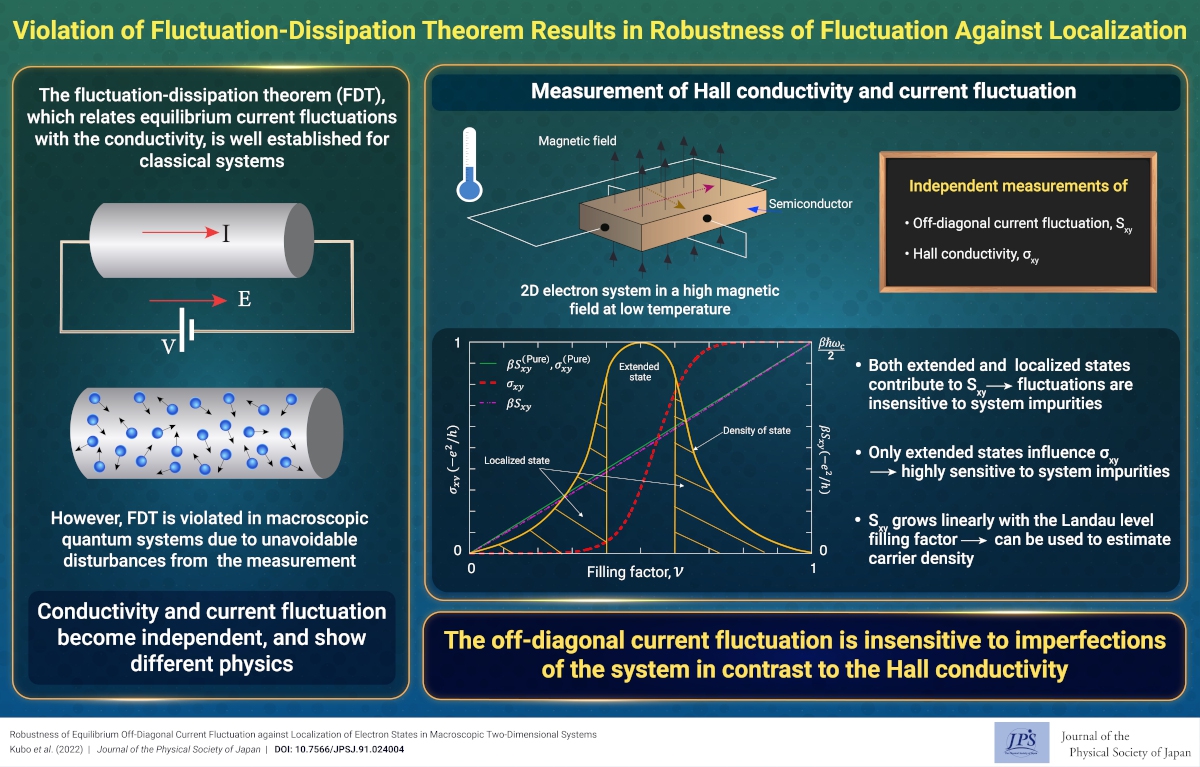Violation of Fluctuation-Dissipation Theorem Results in Robustness of Fluctuation Against Localization
© The Physical Society of Japan
This article is on
Robustness of Equilibrium Off-Diagonal Current Fluctuation against Localization of Electron States in Macroscopic Two-Dimensional Systems
(JPSJ Editors' Choice)
J. Phys. Soc. Jpn. 91, 024004 (2022).
We study equilibrium current fluctuations in systems without time-reversal symmetry, violating the fluctuation-dissipation theorem. Notably, the off-diagonal fluctuation is insensitive to system imperfections in contrast to other fluctuations and conductivity.

The fluctuation-dissipation theorem (FDT) claims that the current fluctuation in a macroscopic equilibrium system is equal to the product of the temperature and electrical conductivity. This “theorem” was proved for classical systems for all components of fluctuations including off-diagonal fluctuations, namely cross-time correlations between currents flowing in different directions.
However, the validity of the FDT in quantum systems was questioned, because disturbances by quantum measurement often play a crucial role, which was ignored in the proof of the FDT for classical systems. Recently, this long-standing question was formally solved, and the FDT was shown to be violated even when the fluctuation is measured in a way that simulates the classical ideal measurement as closely as possible. However, this formal solution neither gave concrete systems that exhibit the FDT violation nor estimated the magnitude of violation.
We propose a two-dimensional electron system in a magnetic field as a real physical system in which the FDT is violated. We clarify the conditions for large violations and show that the magnitude of violation is macroscopically large. In fact, the FDT for the off-diagonal component is significantly violated in a strong magnetic field at low temperatures, whereas the FDT for the diagonal component holds for any values of the parameters. In the standard setup used in the quantum Hall effect experiments, the off-diagonal current fluctuation is several tens of times larger than the product of temperature and Hall conductivity (off-diagonal conductivity).
Such a large violation implies novel properties of off-diagonal current fluctuations that are yet to be studied. Localized states of electrons contribute to the off-diagonal current fluctuation to the same extent as extended states, and hence, the off-diagonal fluctuation is insensitive to system imperfections. This is in sharp contrast to the Hall conductivity that is very sensitive to the imperfections because only extended states contribute. Moreover, as an application of this finding, we propose a new method for estimating the electron number density by measuring the off-diagonal fluctuation. Because fluctuations are a cause of error and noise, our results are expected to provide fundamental design guidelines for applications.
(Written by K. Kubo, K. Asano, and A. Shimizu)
Robustness of Equilibrium Off-Diagonal Current Fluctuation against Localization of Electron States in Macroscopic Two-Dimensional Systems
(JPSJ Editors' Choice)
J. Phys. Soc. Jpn. 91, 024004 (2022).
Share this topic
Fields
Related Articles
-
Exploring Electronic States in BEDT-TTF Organic Superconductors
Superconductivity
Electronic transport in condensed matter
Magnetic properties in condensed matter
2024-4-24
This review, published in the Journal of the Physical Society of Japan, provides a comprehensive summary of the electronic states observed in BEDT-TTF type organic superconductors, including metal-insulator transitions, Mottness transitions, non-Fermi liquids, quantum spin liquids, and Bose-Einstein condensation.
-
Conversion of Chiral Phonons into Magnons in Magnets
Electronic transport in condensed matter
2024-4-1
A new phenomenon involving the conversion of chiral phonons into magnons is theoretically predicted. The effective magnetic field induced by chiral phonons causes a change in the spin magnetization of magnets.
-
Variety of Mechanically Induced Spin Currents in Rashba Systems
Electronic transport in condensed matter
Magnetic properties in condensed matter
Structure and mechanical and thermal properties in condensed matter
2024-3-22
Various types of spin currents, including unconventional types, are generated in Rashba spin-orbit coupled systems by dynamic lattice distortions associated with, for example, surface acoustic waves.
-
What Determines the Sign of Spin Current? ~ Theoretical Study of Spin Seebeck Effect in Antiferromagnetic Insulators
Electronic transport in condensed matter
2024-3-18
We developed a microscopic theory for the spin Seebeck effect in antiferromagnets, that explains the sign reversal of the spin current at the spin-flop transition point and describes the sorts of dominant carriers.
-
Chiral Anomalies in Organic Dirac Semimetals
Electronic transport in condensed matter
2024-2-5
A three-dimensional massless Dirac fermion system exhibiting broken chiral symmetry was successfully realized in organic conductor α-(BEDT-TTF)2I3 under high pressures. Our study detected the chiral anomaly-induced negative magnetoresistance and planar Hall effects and opened new avenues for further advancements in the field.
